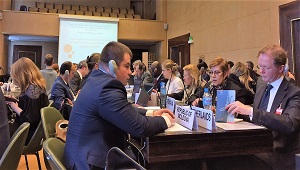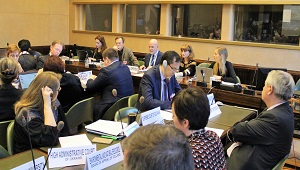
Increasing demands for land and other natural resources, construction of environmentally hazardous installations and industrial accidents put people exercising their rights and seeking justice at the new frontline in the battle for the sustainability of their communities and the future of their children.
The recent report of the United Nations Special Rapporteur on the situation of human rights defenders (A/71/281) and the testimony of different stakeholders highlight the appalling rate of killings, and also threats, harassment and intimidation, of persons who outspokenly oppose activities posing risks to their land and livelihoods. The report revealed that in 2015 three activists were murdered every week worldwide for their opposition to projects in mining, the extractive industries, agribusiness, logging, dams and water-related sectors and poaching.
The situation underlines the crucial importance of the effective implementation of the Aarhus Convention, which not only enshrines States’ obligations to provide public access to information, participation in decision-making and access to justice, but also ensures that persons can exercise their rights without being penalized, persecuted or harassed for their involvement.
In September this year, the Aarhus Parties are expected to adopt the Budva Declaration, in which they will reiterate the importance of protecting environmental human rights defenders, whistle-blowers and other environmental activists, freedom of speech and the safe participation of everyone in decision-making affecting their lives.
At its tenth meeting last week (Geneva, 27-28 February 2017), the Convention’s Task Force on Access to Justice provided a platform for representatives of States, members of the judiciary, international organizations, international financial institutions, non-governmental organizations and other stakeholders to discuss practical measures to enable effective access to justice for all without persecution and harassment.

Opening the meeting, Michel Forst, the United Nations Special Rapporteur on the situation of human rights defenders, highlighted that “the Aarhus Convention’s rights-based approach should be put to good use in order to empower the work of human rights defenders and ensure the Convention’s objective — to protect the right of every person of present and future generations to live in an environment adequate to his or her health and well-being”.
The discussion highlighted the benefits of the protection of environmental human rights defenders, whistle-blowers and other environmental activists to increase transparency, combat corruption, prevent exclusion, improve the quality of decision-making and, ultimately, to achieve sustainable development.
Parties, international financial institutions, NGOs and other stakeholders shared the experience and presented the initiatives designed to further protect and empower whistle-blowers, environmental human rights defenders and other environmental activists. Speakers identified a number of the challenges that needed to be further addressed, including financial and other barriers to access to justice, impunity for perpetrators, lawsuits against public participation, delays in legal proceedings, denials of environmental claims on the grounds of “bad faith”, the criminalization of activists and insufficient public access to legal assistance. The Task Force suggested a number of possible measures that could further advance the protection against prosecution and harassment.
In addition, the participants examined different tools to promote effective access to justice, discussed recent developments related to standing, the scope of review, effective remedies, costs and identified issues that might impede the implementation of the third pillar of the Convention — access to justice.
The outcomes of the Task Force work are expected to facilitate removing the existing barriers and to enable effective access to justice for all.
For further information, please contact:
Ella Behlyarova
Secretary
Convention on Access to Information, Public Participation
in Decision-making and Access to Justice in Environmental Matters
Tel: + 41 (0)22 917 2376
E-mail: [email protected]
Meeting webpage:
https://www.unece.org/env/pp/aarhus/tfaj10.html#/

